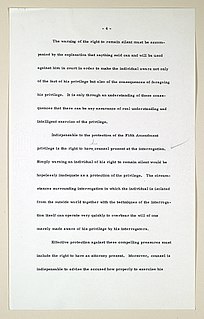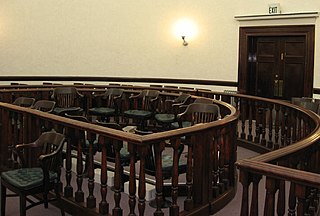Related Research Articles
The adversarial system or adversary system is a legal system used in the common law countries where two advocates represent their parties' case or position before an impartial person or group of people, usually a judge or jury, who attempt to determine the truth and pass judgment accordingly. It is in contrast to the inquisitorial system used in some civil law systems where a judge investigates the case.
An indictment is a criminal accusation that a person has committed a crime. In jurisdictions that use the concept of felonies, the most serious criminal offence is a felony; jurisdictions that do not use the felonies concept often use that of an indictable offence, an offence that requires an indictment.

A jury trial, or trial by jury, is a lawful proceeding in which a jury makes a decision or findings of fact. It is distinguished from a bench trial in which a judge or panel of judges makes all decisions.

In the United States, the Miranda warning is a type of notification customarily given by police to criminal suspects in police custody advising them of their right to silence and, in effect, protection from self-incrimination; that is, their right to refuse to answer questions or provide information to law enforcement or other officials. These rights are often referred to as Miranda rights. The purpose of such notification is to preserve the admissibility of their statements made during custodial interrogation in later criminal proceedings.

Article Three of the United States Constitution establishes the judicial branch of the federal government. Under Article Three, the judicial branch consists of the Supreme Court of the United States, as well as lower courts created by Congress. Article Three empowers the courts to handle cases or controversies arising under federal law, as well as other enumerated areas. Article Three also defines treason.

The Sixth Amendment to the United States Constitution sets forth rights related to criminal prosecutions. It was ratified in 1791 as part of the United States Bill of Rights. The Supreme Court has applied the protections of this amendment to the states through the Due Process Clause of the Fourteenth Amendment.

A jury is a sworn body of people (jurors) convened to render an impartial verdict officially submitted to them by a court, or to set a penalty or judgment. Juries developed in England during the Middle Ages and are a hallmark of the Anglo common law legal system. They are still commonly used today in the United Kingdom, the United States, Canada, Ireland, Australia, and other countries whose legal systems are descended from English and later British legal traditions.
Gideon v. Wainwright, 372 U.S. 335 (1963), was a landmark U.S. Supreme Court decision in which the Court ruled that the Sixth Amendment of the U.S. Constitution requires U.S. states to provide attorneys to criminal defendants who are unable to afford their own. The case extended the right to counsel, which had been found under the Fifth and Sixth Amendments to impose requirements on the federal government, by imposing those requirements upon the states as well.
Trial in absentia is a criminal proceeding in a court of law in which the person who is subject to it is not physically present at those proceedings. In absentia is Latin for "in (the) absence". Its meaning varies by jurisdiction and legal system.
A public defender is a lawyer appointed to represent people who otherwise cannot reasonably afford to hire a lawyer to defend themselves in a trial. Several countries provide people with public defenders, including the UK, Hungary and Singapore, and some states of Australia. Brazil is the only country in which an office of government-paid lawyers with the specific purpose of providing full legal assistance and representation to the needy free of charge is established in the constitution. The Sixth Amendment of the US Constitution has been interpreted to require the US government to provide free legal counsel to indigent defendants in criminal cases, and public defenders in the United States are full-time lawyers employed by or under contract with the state or federal governments.
Right to counsel means a defendant has a right to have the assistance of counsel and, if the defendant cannot afford a lawyer, requires that the government appoint one or pay the defendant's legal expenses. The right to counsel is generally regarded as a constituent of the right to a fair trial. Historically, however, not all countries have always recognized the right to counsel. The right is often included in national constitutions. Of the 194 constitutions currently in force, 153 have language to this effect.

The Fifth Amendment to the United States Constitution addresses criminal procedure and other aspects of the Constitution. It was ratified, along with nine other articles, in 1791 as part of the Bill of Rights. The Fifth Amendment applies to every level of the government, including the federal, state, and local levels, in regard to a US citizen or resident of the US. The Supreme Court furthered the protections of this amendment through the Due Process Clause of the Fourteenth Amendment.
United States criminal procedure derives from several sources of law: the baseline protections of the United States Constitution, federal and state statutes; federal and state rules of criminal procedure ; and state and federal case law. Criminal procedures are distinct from civil procedures in the US.
A citizen’s right to a trial by jury is a central feature of the United States Constitution. It is considered a fundamental principle of the American legal system.

The United States Constitution contains several provisions regarding the law of criminal procedure.
In criminal law, the right to a speedy trial is a human right under which it is asserted that a government prosecutor may not delay the trial of a criminal suspect arbitrarily and indefinitely. Otherwise, the power to impose such delays would effectively allow prosecutors to send anyone to jail for an arbitrary length of time without trial.
The Assistance of Counsel Clause of the Sixth Amendment to the United States Constitution provides: "In all criminal prosecutions, the accused shall enjoy the right...to have the Assistance of Counsel for his defence."

The blank pad rule is an American term for the legal doctrine and metaphor in common law that requires a tribunal to base its decision solely upon evidence established at trial. In the United States, the Supreme Court has established that in order for a trial to be fair and impartial, a "jury's verdict [must] be based on evidence received in open court, not from outside sources".
Klopfer v. North Carolina, 386 U.S. 213 (1967), was a decision by the United States Supreme Court involving the application of the Speedy Trial Clause of the United States Constitution in state court proceedings. The Sixth Amendment in the Bill of Rights states that in criminal prosecutions "...the accused shall enjoy the right to a speedy trial" In this case, a defendant was tried for trespassing and the initial jury could not reach a verdict. The prosecutor neither dismissed nor reinstated the case but used an unusual procedure to leave it open, potentially indefinitely. Klopfer argued that this denied him his right to a speedy trial. In deciding in his favor, the Supreme Court incorporated the speedy trial protections of the Sixth Amendment against the states.
Lafler v. Cooper, 566 U.S. 156 (2012), was a United States Supreme Court case in which the Court clarified the Sixth Amendment standard for reversing convictions due to ineffective assistance of counsel during plea bargaining. The Court ruled that when a lawyer's ineffective assistance leads to the rejection of a plea agreement, a defendant is entitled to relief if the outcome of the plea process would have been different with competent advice. In such cases, the Court ruled that the Sixth Amendment requires the trial judge to exercise discretion to determine an appropriate remedy.
References
- ↑ Legal dictionary
- ↑ Wikisource of Article III.
- ↑ Ballentine's Law Dictionary, p. 378